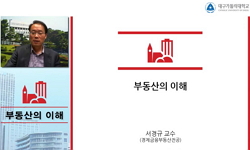Nowadays, it is one of core issues for Korean government to stabilize the price of dwelling houses and their sites. For this purpose, the government must properly regulate the speculation on lands and dwelling houses. This is the background of legisl...
http://chineseinput.net/에서 pinyin(병음)방식으로 중국어를 변환할 수 있습니다.
변환된 중국어를 복사하여 사용하시면 됩니다.
- 中文 을 입력하시려면 zhongwen을 입력하시고 space를누르시면됩니다.
- 北京 을 입력하시려면 beijing을 입력하시고 space를 누르시면 됩니다.
https://www.riss.kr/link?id=A347694
-
저자
유일언 (충남대학교 법과대학)
- 발행기관
- 학술지명
- 권호사항
-
발행연도
2004
-
작성언어
Korean
-
주제어
종합부동산세 ; Aggregate Real Estate Tax ; 부동산 ; real estate ; 투기억제 ; regulate the speculation ; 주택 ; dwelling house ; 토지 ; lands ; 부동산세 ; Real Estate Tax ; 지방재정 ; local finance
-
KDC
360.000
-
자료형태
학술저널
-
수록면
1-22(22쪽)
-
KCI 피인용횟수
1
- 제공처
-
0
상세조회 -
0
다운로드
부가정보
다국어 초록 (Multilingual Abstract)
This is the background of legislation of the Aggregate Real Estate Tax Law. The purpose of this law is to promote equality of tax burden among real estate owners and stability of price of real estates such as dwelling houses and lands, to thereby encourage well-balanced development of local finance, and to strive sound development of national economy by imposing the Aggregate Real Estate Tax on owners of highly priced real estates such as lands and dwelling houses.
Therefore, this research is to examine to what extent the consents of this law is suitable for its purposes.
As for the stability of prices of real estates, it is doubtful that Aggregate Real Estate Tax alone can not stabilize real estate market because land is not productive goods. It is also negative that this tax can promote equality of tax burden among real estate owners because steps of tax base is simple and the tax rate is simple progressive enough to be regressive. Also it can not be expected that this tax will contribute to the well-balanced development of local finances since highly priced real estates are usually situated in cities, especially big cities such as Seoul, Busan, Daegu, Daejon, Inchon, Kwangju, and so forth.
Thus, it is advisable to readjust the contents of this tax law to be effective in stability of real estate market, to put fair tax burden among real estate owners, and to promote balance of local finance.
Nowadays, it is one of core issues for Korean government to stabilize the price of dwelling houses and their sites. For this purpose, the government must properly regulate the speculation on lands and dwelling houses.
This is the background of legislation of the Aggregate Real Estate Tax Law. The purpose of this law is to promote equality of tax burden among real estate owners and stability of price of real estates such as dwelling houses and lands, to thereby encourage well-balanced development of local finance, and to strive sound development of national economy by imposing the Aggregate Real Estate Tax on owners of highly priced real estates such as lands and dwelling houses.
Therefore, this research is to examine to what extent the consents of this law is suitable for its purposes.
As for the stability of prices of real estates, it is doubtful that Aggregate Real Estate Tax alone can not stabilize real estate market because land is not productive goods. It is also negative that this tax can promote equality of tax burden among real estate owners because steps of tax base is simple and the tax rate is simple progressive enough to be regressive. Also it can not be expected that this tax will contribute to the well-balanced development of local finances since highly priced real estates are usually situated in cities, especially big cities such as Seoul, Busan, Daegu, Daejon, Inchon, Kwangju, and so forth.
Thus, it is advisable to readjust the contents of this tax law to be effective in stability of real estate market, to put fair tax burden among real estate owners, and to promote balance of local finance.
목차 (Table of Contents)
- Ⅰ. 서언
- Ⅱ. 부동산보유세의 개관
- 1. 부동산보유세의 의의
- 2. 부동산보유세의 성격
- 3. 부동산보유세와 응익원칙
- Ⅰ. 서언
- Ⅱ. 부동산보유세의 개관
- 1. 부동산보유세의 의의
- 2. 부동산보유세의 성격
- 3. 부동산보유세와 응익원칙
- Ⅲ. 종합부동산세의 신설의의와 내용
- 1. 종합부동산세 신설의 의의
- 가. 종합부동산세의 신설배경
- 나. 부동산가격 급등의 원인
- 다. 부동산관련 세제의 개선
- 2. 종합부동산세의 내용
- 가. 총칙
- 나. 주택에 대한 과세
- 다. 토지에 대한 과세
- 3. 종합부동산세의 신고·납부 및 보칙
- 가. 신고·납부 등
- 나. 보칙
- Ⅳ. 종합부동산세에 대한 전망
- Ⅴ. 결론
동일학술지(권/호) 다른 논문
-
- 忠南大學校 法學硏究所
- 박광섭
- 2004
-
- 忠南大學校 法學硏究所
- 이재곤
- 2004
-
최근 판례에 나타난 지방자치단체의 사무와 조례제정의 법리
- 忠南大學校 法學硏究所
- 김재호
- 2004
-
- 忠南大學校 法學硏究所
- 沈景秀
- 2004
분석정보
인용정보 인용지수 설명보기
학술지 이력
| 연월일 | 이력구분 | 이력상세 | 등재구분 |
|---|---|---|---|
| 2027 | 평가예정 | 재인증평가 신청대상 (재인증) | |
| 2022-08-23 | 학회명변경 | 영문명 : Chungnam National University Law Resarch Institute -> Chungnam National University Law Research Institute |  |
| 2021-01-01 | 평가 | 등재학술지 유지 (재인증) |  |
| 2018-01-01 | 평가 | 등재학술지 유지 (등재유지) |  |
| 2015-01-01 | 평가 | 등재학술지 유지 (등재유지) |  |
| 2013-12-31 | 학술지명변경 | 외국어명 : 미등록 -> Journal of Law |  |
| 2011-01-01 | 평가 | 등재학술지 선정 (등재후보2차) |  |
| 2010-01-01 | 평가 | 등재후보 1차 PASS (등재후보1차) |  |
| 2008-01-01 | 평가 | 등재후보학술지 선정 (신규평가) |  |
학술지 인용정보
| 기준연도 | WOS-KCI 통합IF(2년) | KCIF(2년) | KCIF(3년) |
|---|---|---|---|
| 2016 | 0.65 | 0.65 | 0.73 |
| KCIF(4년) | KCIF(5년) | 중심성지수(3년) | 즉시성지수 |
| 0.74 | 0.79 | 0.817 | 0.22 |




 RISS
RISS DBpia
DBpia






